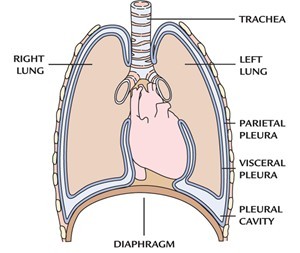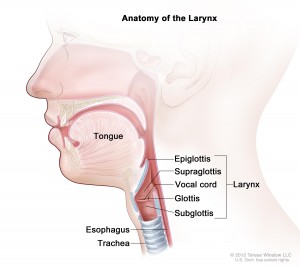Hiccups (or Hiccoughs) are defined as two seemingly simultaneously involuntary contractions in the diaphragm and larynx, that causes the epiglottis to close causing the characteristic hic noise. That’s a whole lot of science to mean that something in your belly and your neck tense up causing a little flap in your throat to close. Let’s start with what happens in your belly. The diaphragm is a muscular dome that is found at the base of our breathing system.

Located at the bottom of our lungs it separates our lungs from the rest of internal organs. So when we breath in the muscle contracts, pushing down all the organs below, our stomach, liver, kidneys and all, so that our lungs can fully expand with air.
Next we have the contraction in the larynx. The larynx or voice box is found in our throat and contains the supraglottis, the vocal cords, the glottis, the subglottis and, most importantly for hiccups, the epiglottis.

The epiglottis is that little flap that’s red with blue in the center all the way at the top of the larynx. Now when we breathe in and out all that air has to travel past the open epiglottis to get into our lungs. When we swallow food, it snaps shut to keep it from getting down into the trachea (our breathing tube) and causing us to choke.
So what happens when we hiccup? Basically there is a spasm in the diaphragm. A spasm is when a muscle quickly tenses up without us using our brain to tell it to do so. So rather than normally contracting and relaxing as we breathe, suddenly it sharply contracts. At the same time in our throat, the epiglottis snaps shut and there isn’t even any food it needs to protect our lungs from! For just a moment we can’t breath, which causes us to make the hic sound of a hiccup, as the air gets stopped by the epiglottis as we try to breathe it in.
But why do we hiccup? Well the biological, sciencey explanation is our vagus nerve causes these contractions. Our nervous system controls EVERYTHING in our body. Many of them work to run our body, making it pump blood, breathe, digest food, without our having to even think about it. The vagus nerve connects our brain to our organs so that it can keep our heart at a constant rhythm, digest our food and keep our body breathing. Now the series of contractions happen when our vagus nerve gets stimulated, or tickled, in a certain way that it tells our diaphragm to contract and our epiglottis to close.
Now here is where we get to the tricky part. Scientists still have not discovered the reason why we hiccup. In fact, hiccuping, despite being found in animals as well as humans, serves no actual purpose. It is a completely useless function! Here are some possible causes:
- Drinking fizzy drinks
- Eating too quickly
- Eating too much, which puts pressure on the diaphragm
- Sudden changes in your environment’s temperature
- Eating hot or spicy food
- Drinking alcohol
But we still do not what it is about all of these different causes that sometimes do and don’t cause hiccups.
How do you get rid of hiccups? There are many different solutions, eating sugar or peanut butter, taking tiny sips of water, making yourself gag or, as the legend goes, scaring someone so they gasp and forget about their hiccups. None of them have proved to be the be all end all solution so keep exploring until you find out what works for you. That being said, if your hiccups last longer than 48 hours, you should go see a doctor!
Souces:
http://www.medicalnewstoday.com/articles/181573.php?page=2
What are hiccups, and how exactly can you get rid of them?
https://en.wikipedia.org/wiki/Larynx
https://en.wikipedia.org/wiki/Thoracic_diaphragm
https://en.wikipedia.org/wiki/Vagus_nerve
http://www.healthline.com/human-body-maps/vagus-nerve